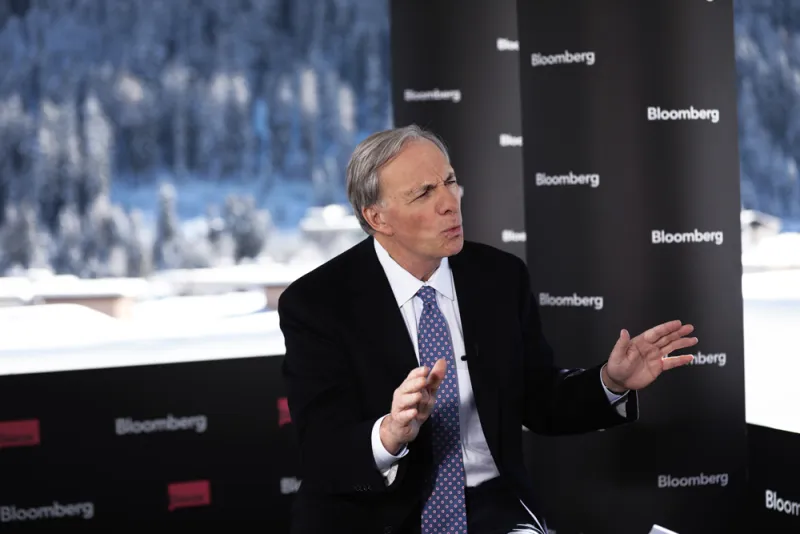One of America’s highest-earning hedge fund managers is sounding the alarm on the widening gap between the wealthy and the poor in the U.S.
Ray Dalio, founder of $160 billion hedge fund Bridgewater Associates, has published a two-part series of LinkedIn posts arguing that the increasing disparities in income, wealth, and opportunities among Americans “pose existential threats to the U.S.”
“These conditions weaken the U.S. economically, threaten to bring about painful and counterproductive domestic conflict, and undermine the United States’ strength relative to that of its global competitors,” Dalio wrote in the two LinkedIn posts published Thursday and Friday.
Citing a number of stats that illustrated how income growth has stagnated among the bottom 60 percent of earners – while skyrocketing among the top 20 percent – Dalio concluded that U.S. capitalism is “not working well for the majority of Americans.”
“It’s producing self-reinforcing spirals up for the haves and down for the have-nots,” he wrote.
For instance, Dalio wrote that the top 40 percent of earners had on average six times as much wealth as those in the bottom 60 percent in 1980. As of 2016, the top 40 percent had on average more than ten times as much wealth as the bottom 60 percent, Dalio said, citing data from the Federal Reserve's latest survey of consumer finances.
“Most people in the bottom 60 percent are poor,” he wrote. “And they are increasingly getting stuck being poor.”
[II Deep Dive: Why Paul Tudor Jones Fears a ‘Revolution’]
The main reasons why capitalism has stopped working for most people, according to Dalio, are the rise of technologies that replace human workers, the globalization of American companies at the expense of American workers, the rising prices of financial assets resulting from post-2008 monetary policy, and the focus of policymakers on budgets rather than returns from investments.
“While the pursuit of profit is usually an effective motivator and resource allocator for creating productivity and providing those who are productive with buying power, it is now producing a self-reinforcing feedback loop that widens the income/wealth/opportunity gap to the point that capitalism and the American Dream are in jeopardy,” Dalio wrote.
Based on this diagnosis, Dalio prescribed a way to reform capitalism to “provide many more equal opportunities and to be more productive.”
The hedge fund manager first called for strong leadership, arguing that there “need to be powerful forces from the top of the country to proclaim the income/wealth/opportunity gap to be a national emergency and take on responsibility for reengineering the system so that it works better.” These leaders, Dalio said, need to form a bipartisan commission made up of skilled people from different communities who can “come up with a plan to reengineer the system to simultaneously divide and increase the economic pie better.”
In addition, Dalio — alluding to the policy of “radical transparency” that he employs at his own firm — recommended the adoption of an “accountability culture in which individuals are aware of whether they are net contributors or net detractors to the society, and the individuals and the society make attempts to make them net contributors.”
Finally, Dalio said resources needed to be redistributed to “improve both the well-beings and the productivities of the vast majority of people,” including by creating public-private partnerships to invest in “double-bottom line projects” like early childhood education programs, infrastructure projects, and preventative healthcare. Other forms of resource redistribution proposed by Dalio included taxing pollution and causes of bad health, raising taxes on the most wealthy in ways that do not disrupt productivity, establishing minimum standards of healthcare and education, and coordinating monetary and fiscal policies.
The billionaire hedge fund manager has himself begun tackling at least one of the problems with modern capitalism highlighted in his LinkedIn treatise: the underfunding of public schools and education systems, which he described as “the equivalent of child abuse” and “economically stupid.”
On Friday, Dalio and his wife Barbara announced a $100 million donation to strengthen the public education system and promote greater economic equality in their home state of Connecticut. The donation is part of a partnership with state governor Ned Lamont to raise $300 million from the state, philanthropists, and community business leaders to support underprivileged youth.
“Equal access to education and job opportunities are required for any system to be fair and productive,” Dalio said in a statement announcing the donation. “We hope to make these changes sustainable over the long run by raising incomes, lowering social costs, and making Connecticut a more hospitable environment for those who will contribute to its well-being.”







